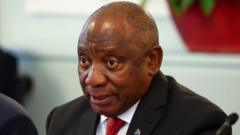Ugandans view Mamdani’s NYC win as a ‘beacon of hope’ amid democratic struggle
Ugandans reacted with joy and of hope to the news that Kampala-born Zohran Mamdani had been elected mayor of New York City, amid a stormy democratic and rights environment in east Africa.
Mamdani, who was born in Uganda 34 years ago to a family of Indian origin, on Tuesday defeated former governor Andrew Cuomo and Republican Curtis Sliwa to become the city’s first Muslim mayor and the first of south Asian heritage.
He has lived in the US since he was seven years old. In his 20s, under the stage name Young Cardamom, he made music with Ugandan rapper HAB.
Many in Uganda had not heard of Mamdani before the election win or that a Ugandan had become the youngest mayor of New York City in more than a century.
But there was excitement and pride at Makerere University in the Ugandan capital, Kampala, where Mamdani’s father taught until a few years ago.
“Seeing Zohran up there, I feel like I can also make it,” psychology student Anthony Kirabo told Agence France-Presse (AFP).
“It makes me feel good and proud of my country because it shows that Uganda can produce some good leaders,” said the 22-year-old, adding that he hoped it might encourage more tourists to come to the east African country.
Mamdani’s win comes at a trying period for democracy in east Africa, where observers describe growing repression and violation of human rights in some countries.
Uganda’s neighbour Tanzania is reeling from bloody election violence last week in which hundreds of people were reported to have been killed in demonstrations against what protesters said was the stifling of the opposition after the exclusion of key candidates from the presidential ballot.
Some hoped Mamdani’s victory would provide a lesson for Ugandan leaders as the country readies itself for a potentially fraught general election in January, with Yoweri Museveni, the president who has ruled the country for 39 years, seeking to extend his grip on power into a seventh term.
Developments in the run-up, including the months-long detention of opposition politician Kizza Besigye, the passage of a bill to try civilians in military court and the abduction of two Kenyan rights activists, have turned the spotlight on what critics deem intolerance and authoritarianism by Museveni’s administration.
Joseph Sendagire, a 28-year-old procurement officer, told AFP he hoped Uganda would “borrow a leaf” from New York City’s mayoral election.
“Uganda should embrace a culture of free and fair elections, allow candidates to compete for whatever post we want in a fair manner, treat them equally, and then at the end of the day, may the best candidate win,” he said.
Robert Kabushenga, a retired media executive who is friendly with the Mamdani family, told the Associated Press that the win offers “a beacon of hope” for embattled activists and others in Uganda. The lesson is that “we should allow young people the opportunity to shape, and participate in, politics in a meaningful way,” he said.
Bobi Wine, Museveni’s main challenger, sent “hearty congratulations” to Mamdani.
“From Uganda, we celebrate and draw strength from your example as we work to build a country where every citizen can realize their grandest dreams regardless of means and background,” the 43-year-old wrote on X.
Joel Ssenyonyi, the leader of the opposition leader in the Ugandan parliament, told the AP he sees Mamdani’s victory as an inspiring political shift but somehow too distant for many Africans at home.
“It’s a big encouragement even to us here in Uganda that it’s possible,” said Ssenyonyi. “But we have a long way to get there.”
Agence France-Presse and the Associated Press contributed reporting






















